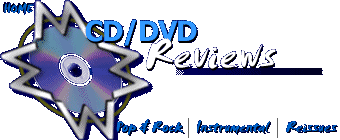 
|
||||
|
|
THE SURF HERMITS |
|||
|
The second album from The Surf Hermits, Showdown effectively blends an established West Coast surf-rock sound with a sonic diversity that manages to embrace atmospheric Spaghetti Western sounds as well as 1960s instrumental garage and punk-rock sounds, giving the overall sound a bit less subtlety while lacing the tracks with a more aggressive, commanding edge. All the Showdown tracks are well-recorded and have a lot to offer fans of the guitar instrumental genre. Give a listen to one of the album’s key tracks, a Ventures inspired number that starts off with a daring gunshot blast, simply called “The Revolver”. If you like your instrumental surf guitar sound with a solid rock edge, The Surf Hermits hit the spot with Showdown.
mwe3.com presents an interview with
Jason Deatherage: I had a bit of trouble thinking of a title for the album, to be honest. The simplicity and relevance of Hang Zen sort of spoke for itself, but nothing immediately leapt to mind for this album initially. The fantastic art by Joe Yod of Rude Commissions was what tipped me over to using Showdown as a title, but there are a lot of other layers to it as well. Firstly, there’s an actual showdown in progress on the cover, but I’ve always been a fan of old Samurai movies and Westerns, in which there were always showdowns occurring. Also, for me, there is always a certain confrontation involved in the creative process; I am often running up against limitations in my own playing that I have to face, as well as never truly knowing how things are going to turn out. In my earlier life, I fought in weapons tournaments using sword or spear, and taught sword publicly, which attracted old school challenge matches from time to time. So I’ve felt a little of what a showdown brings: that facing of our fears, that measuring of ourselves against something or someone that doesn’t necessarily have our best interests at heart. The creative process is that same feeling to me; it’s never predictable and it can go terribly wrong with a single bad decision. The stakes aren’t the same as a gun or swordfight, but in a sense there are still important stakes because the result is so personal. The cover art by Rude Commissions is so amazing. He translated a couple of sentences describing the concept I was after into exactly what I was imagining. I’ve always been a huge fan of Japanese art and philosophy, and this cover really nails that for me, and adds that sort of 1950’s rock and roll rumble vibe to it. To me the Surf Hermits are that monk stepping up onto the beach into a different world, facing the established sounds and aesthetics of the surf scene as it has been generally understood. I’m bringing something into the scene that hasn’t been there, and challenging some of the habits and tropes that circulate in surf music, but hopefully in a way that positively adds to the scene and lifts people up. mwe3: Tell us about writing all the music and performing all the instruments on Showdown yourself? Can you tell us something about how you recorded the music? There must have been a lot of overdubbing, so in what order were the instruments layered? Do you ever record or perform live with other musicians and bands? Jason Deatherage: Songs generally start with a seed idea that appears on the guitar, often in the middle of working on other material. I’m frequently opening new projects and recording a riff or a line, then going back to what I was working on. I’ll sift these ideas and develop the ones that grab me. It usually starts with a guitar sketch, which I’ll work into a full arrangement, often by singing along and following where I’d want to go if I was listening to this song on the radio. Does the chorus lift where it should? Is this part interesting? How can I break my own habits? Subsequent parts in the tunes are often created through this process.
Finally, I start to figure out the melody, which is really the longest, most demanding process. I’m not a technically accomplished guitar player and I play entirely by ear, so it is really a process of wandering around and grabbing onto cool things that come out, then working those things out into longer passages. I try to do everything well, but I also will leave minor mistakes in that aren’t too obvious, again because it gives a bit more of a live energy to the recording. By the time I get the melody down, the tune has gotten exciting to me and other little parts start to appear. Often the tunes I struggle with the most are the ones I like the most once they’re done. I worked for years as a session drummer, and have played many thousands of live gigs with dozens of bands. Currently I play drums with a super cool band call Garuda, which features sitar, electric bass, and drums. I also play in a band with my dad who turns 82 this year, which is call the Howlin’ Wannabes, and rocks pretty hard. I’ve been doing drums for lots of other artists in the surf scene these days, as well, which has been very fun and a great way to build some bridges in the community. mwe3: Tell us more about your guitars. I saw your video on the gear you used to record Showdown but for the interview can you again mention a few of your favorite guitars, amps and some effects / devices that you use to tailor your sound? You call them “effective tools”. What makes the Telecaster better than the Strat and what made you want to modify some of your guitars? Also do you have a current favorite guitar manufacturer?
As for what makes a Tele better than a Strat, they’re just different animals that do different things. I prefer the Tele mainly because I’m used to it. I have trouble getting the fullness I’m looking for out of the Strat that I have available to me, but I use it for the whammy bar frequently, or for a different sound for a rhythm track. There’s a fair amount of Strat on Showdown, mainly in the background supplementary guitar parts. I also occasionally use an ES335, depending on what sounds I’m looking for. I run the Tele into a Boss tuner which is a critical piece of the chain. Tuning is so critical to everything, so I like to be able to tune as often as needed. Fortunately, my Tele is very stable and stays in tune for days at a time. 90% of all the sounds on Showdown are just the Tele into a Fender Deluxe Reverb Tonemaster amp. The Tonemasters are digitally modeled/solid state versions of the classic Fender amps, but they don’t try to stick 100 sounds in there, they just faithfully reproduced the sound and feel of the classics. It’s such a great amp in so many ways. It’s less than half the weight of the tube version, there’s no dealing with fragile tubes and cold solders, and it has some amazing features like being able to dial down the wattage. The other feature that I use on every tune is the direct output, which sounds amazing. I just use the onboard reverb and vibrato for my sound. If I need a bit more grit or sustain, I’ll use either a JHS Andy Timmons Distortion pedal, which is what is on Showdown, or the pedal I more recently acquired which is the Electro Harmonix Soul Food. I really like the Soul Food for the smoothness of its drive, and the ability to dial it back so it just adds more sustain to the natural sound of the amp. For other sounds I have an EHX digital delay, a Q-tron envelope filter and an EXH wah pedal. mwe3: Also how did a drummer, as you said you were first, switch to guitar? Jason Deatherage: I ended up picking up the guitar mainly to be able to express more musical ideas. I have produced a lot of albums and used studio players to add the guitar parts. That process involved me directing them to play things and picking through the stuff they were playing to zero in on the right parts for the songs. I realized that a lot of that sort of thing I could likely do myself, and as I played more and more, I really started to enjoy the playing itself. I thrive on challenges, and even a very minor success on the guitar seems like a great victory because of my relatively low skill level. mwe3: Tell us about growing up in British Columbia in Canada. It’s on the west coast of Canada so you weren’t lacking an ocean. Is that one reason you gravitated to Surf-Rock instrumental sounds? What bands, albums and other musical concepts drove you further towards your chosen musical destination? I saw you mention Piercing Cloud Sword School on your Facebook page and that you also work as a paramedic in British Columbia as well? I guess it’s good to walk on a number of different career paths.
Guitar centered instrumental music has always turned my crank, and I really consider the work of Joe Satriani and Steve Vai to be descended from what people like Dick Dale were doing. I listen to a lot of different things, but I love fusion, Return to Forever, Mahavishnu Orchestra, Miles Davis’ Bitches Brew, etc. Those types of things are just complicated instrumental music, but similar in that they involve an energetic approach. Surf music is action music to me, and I strive to capture a certain drive and momentum, and love to try and couple it with chord changes and melodic movement that makes me feel something. That’s what I have always loved about Joe Satriani: he’s technically great and can shred for days, but it’s really all about how he can move chords under a melody and evoke a sort of melancholy sadness even while the groove is driving you forward. I see myself as a pretty boring person but when I think about it, I’ve done a lot of weird things. I studied martial arts very intensively for a long time, living with different Masters for various amounts of time and really throwing myself into learning as deeply as possible. To me it’s all related, the music, the creative process, the martial arts and philosophy, and the life and death nature of my job as a Paramedic. It’s this constant shifting of various perspectives on some very central principles of life that allows for hopefully developing some wisdom and clarity. It’s always a learning process. mwe3: What era and music were you first exposed to while growing up in Canada? Was guitar your first instrument or were there lots of instruments played in your home? Do you remember your first guitar or guitar(s)? You also mentioned your Father as a musical influence and cohort, which must have been great. What does your Dad think of The Surf Hermits? He must be proud of the sound of the new album. Jason Deatherage: When I grew up, my parents were avid music listeners and we had a lot of cool records around. Black Sabbath, Cream, Led Zeppelin, Ry Cooder, JJ Cale, and so many others. When I grew up here, we didn’t have power or running water for a few years, but once we had power, the record player came out and I would listen to records on headphones. My dad played guitar ever since he was sent one in Vietnam, and I have very early memories of his music room in the houses we lived in. He bought one of the first available Tascam cassette 4 tracks, and has probably recorded hundreds of songs in his life so far.
Dad has always been a central part of my musical life. As my own skills developed and as I eventually moved to the city for university, I also had access to more advanced recording equipment. He came to the city with some friends and we all recorded the first Howlin’ Wannabes album, which would be the first of many. I also produced many albums of his solo material as well as a multi-part audio book with a song for each chapter, called “Sun Pipes For The Dreamers”. It was through his material that I learned how to produce an album properly, and took those lessons into producing records for other people. That process still continues, and my own work with the Surf Hermits is descended from those lessons learned along the way. It’s been amazing to have this lifelong musical relationship that still continues. I wish I had even more time to devote to it, but I do what I can. I think he appreciates what he hears, and I hope he can take some credit for helping foster what I’ve accomplished so far. Both of my parents have been so supportive all of my life, and my Mom, who has also done a bit of everything, but was a sculptor and painter as well as a nurse and adventurer, is equally responsible for inspiring and supporting music in my life. mwe3: You said your name has French roots but then I saw it’s quite a common name. I learn new things every day, especially about names! What else can you tell us about the D'eatherage family tree and name? Were your parents and grandparents born in Canada as well? Jason Deatherage: I think my name is originally of French origin, as in D'eatherage, but it does have a certain heavy metal charm to it. My parents are actually Americans who relocated after Dad got back from Vietnam. The Deatherage name is common in Texas where my Dad is from. mwe3: How do the Surf Hermits fit into the 21st century instrumental surf-rock sound? Jim from The Breakers turned me on to the Surf Hermits. Are you more influenced by the Canadian instrumental bands or the US and European / Asian guitar bands? It seems like instrumental guitar music is the international language. Every country has guitar instrumental music, which is something I thought was fascinating when I was young and I still do…
I’m more likely to learn a weird pattern in a Mahavishnu Orchestra tune and try to build something like that, rather than try to sound like the Astronauts or something. That being said, there are some amazing bands happening in the scene these days, and I’m so proud to be on the label with them, or to be collaborating with them. I almost feel like I’m trying to do Satriani style instrumental albums, but surf-style because it’s got cooler tones and a simpler melodic approach. I think I tend to go deeper into melodic movement than a lot of stuff I hear from other bands, but that’s just my own inclinations at work. mwe3: How did you get signed with Sharawaji Records? They’re based in the UK right? Interesting that they have a global reach when it comes to releasing music from Surf Rock artists and bands globally. What Sharawaji artists are you tuned into these days? Tell us about the label. Jason Deatherage: Sharawaji has been a great label so far. They’ve been really supportive and encouraging. I had recorded my first album and set everything up on Bandcamp, but left it private so I could give some labels a sneak peek. I didn’t really know much about the surf scene, or even that there was a surf scene, but I did a bit of research and came up with a few labels I wanted to contact. Sharawaji was interested right away, and to be honest, I went with them because they seemed to believe in the music. In terms of what other bands I’m tuned into on the label, I can pretty safely say all of them! There are some that I’ve been more closely involved with however, like Angry Red Planet, which is one of Sharawaji’s newest acts. They are fronted by my good friend Rodd Keen, whom I’ve collaborated with for many years now in a vast variety of genres and bands. Rodd writes amazing stuff, heavy, whimsical, frenetic. I played drums on this album, and we also recently just completed a super cool collaboration call S.H.A.R.P. (Surf Hermits / Angry Red Planet) which hopefully will be releasing an EP soon. Another really great act on Sharawaji is Jim and the Sea Dragons, who are based in Florida. I did a really neat split EP with them last Halloween called the Beat From 20,000 Fathoms, which featured 2 tunes from each band. I also played drums on their latest release which is a really amazing collection of covers of French instro tunes from the 1960s. Another new act that blew me away is Robotron, from Norway. Also Magnatech is a great band from Ireland that does the trad instro thing really well. There are some really killer veteran acts on Sharawaji too, like the Breakers, the Underwater Bosses, the Jagaloons, Black Valley Moon, Terrorsurfs, King Ghidora, the Wasagas… I might as well just name them all! It's not just limited to Sharawaji though. There’s a lot of crossover, and people appearing on multiple labels. The other labels are fantastic as well, and it seems like everyone works well together to support surf music generally. So many good bands out there, and interesting too. Daikaiju, Sean Eddy, Arno de Cea and the Clockwork Wizards, Sys Malakian, and so many others…
Jason Deatherage: It’s hard because once recording technology became universally accessible then we really started to have a glut of available music. The internet has sort of both helped and hurt this situation by making publicity universally accessible too. I think if you dig in a learn, you can figure out how to connect with whatever niche you inhabit as a musician, but it’s a different world than it used to be. There is so much music out there, the listener’s chance of finding you on their own is very low, even if they’re a motivated fan of a genre. It seems to lessen peoples’ appreciation of a band as well, because there’s a thousand bands vying for their attention and there is always something new to move onto. In the past, the choices were more limited and a listener was more likely to really listen to your record deeply because they didn’t have a thousand other similar bands immediately available effectively for free like they do now. Even if you can poke your head up above the crowd nowadays, you will immediately disappear the moment you stop actively working to increase your presence. There is a lot of work to the content creation and distribution side of things and each platform has its own methods. I’m still a bit stuck in the yearly album release mode because that’s how I enjoy music, but I’m considering trying a more modern style of constant releases throughout the year, a song at a time as they get recorded, along with supplementary video material, then collecting it as an album later. We’ll see, and of course Sharawaji gets a bit of a vote in that process too. mwe3: Are you always writing and recording or do you spend a lot of time practicing and/or getting new ideas for songs and arrangements? What is your practice routine? Jason Deatherage: I’ve always been bad at practicing. I really feel like the practice is in the actual doing of music for me. If I don’t know how to do something, I sit down and record a song that will make me do it, or I’ll do it for the first time on a gig where the stakes are at their highest. Much of the progression of my guitar playing is happening as I record Surf Hermits music. I don’t build that stuff beforehand, I struggle and search and fail and then put something together that works, and listening back realize that I’ve gotten better somehow in that process. For me it’s more praxis than practice, and it’s only in the real application of playing that I get any enjoyment out of it. mwe3: Tell us about your plans for 2022 and beyond. What are you hoping for and planning next? Will there be more recordings by The Surf Hermits in the near future and what musical directions are you looking towards next?
I hope to get out and do some live shows as well, and I have a collection of great players that are down for translating the Surf Hermits into a banging live act.
|
|
|||
|
||||

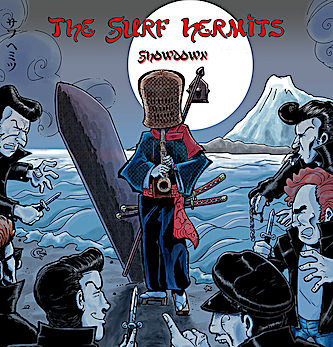 Hailing from British Columbia, Canadian surf-rockers The Surf Hermits hit the beach, making global waves in the instrumental rock world. The band’s sound is fairly straight ahead and very upbeat on their 12-track, 2022 CD simply called Showdown. Described by devotees of the genre as ‘aggressive modern surf’, Surf Hermits’ lead guitarist and main composer Jason Deatherage leads the charge on a very compelling album that also features an arty Japanese inspired album cover. The full-bodied sound may be a bit deceptive as Jason wrote, produced and recorded the album entirely by himself and he proves to be quite an adept one-man-band operation as he kicks up quite a storm throughout the album.
Hailing from British Columbia, Canadian surf-rockers The Surf Hermits hit the beach, making global waves in the instrumental rock world. The band’s sound is fairly straight ahead and very upbeat on their 12-track, 2022 CD simply called Showdown. Described by devotees of the genre as ‘aggressive modern surf’, Surf Hermits’ lead guitarist and main composer Jason Deatherage leads the charge on a very compelling album that also features an arty Japanese inspired album cover. The full-bodied sound may be a bit deceptive as Jason wrote, produced and recorded the album entirely by himself and he proves to be quite an adept one-man-band operation as he kicks up quite a storm throughout the album.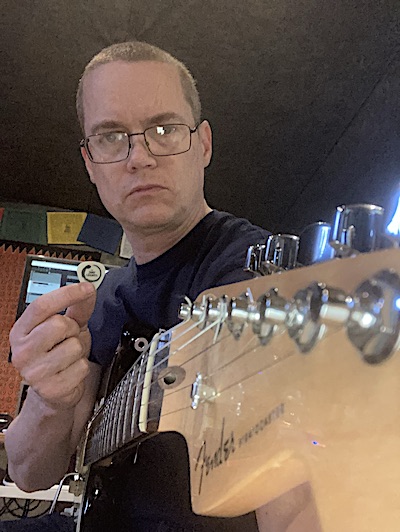 mwe3: Tell us about the 2022 Surf Hermits CD called Showdown. Why do you call it Showdown and how would you compare it with the first Surf Hermits album Hang Zen, both musically and compositionally? With an album title like that and the cover art on Showdown, byRude Commissions,were you influenced by Japanese artwork?
mwe3: Tell us about the 2022 Surf Hermits CD called Showdown. Why do you call it Showdown and how would you compare it with the first Surf Hermits album Hang Zen, both musically and compositionally? With an album title like that and the cover art on Showdown, byRude Commissions,were you influenced by Japanese artwork? 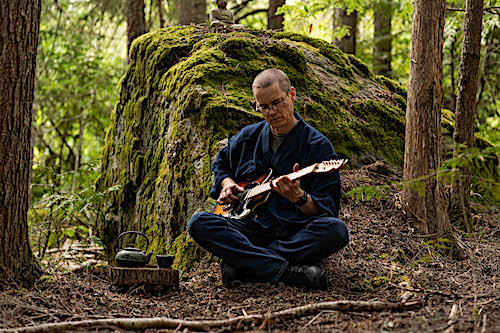 A lot of times, that guitar sketch becomes the bassline for the song, and I’ll go back and lay the bassline out properly so I have something solid to add the drums to. Then I record the drums, which can be a quick process but sometimes will force me to backtrack. If I’m having difficulty with a section of the song, sometimes that will be subtle timing problems in the bassline, so I’ll go back and fix that, then re-record the drums. Once I have the bass and drums, I’ll start to think about the chords that work for my ear over the bassline, and I’ll lay down a basic rhythm guitar part, then either double it or do something that is complementary with the first part. I like doubling rhythm parts because it fills out the soundstage, but also the natural variations between the two parts give everything a bit of a live feel. During this process, if I hear things that should go on there, I’ll record those, or at least sketch the ideas if they’re technically demanding.
A lot of times, that guitar sketch becomes the bassline for the song, and I’ll go back and lay the bassline out properly so I have something solid to add the drums to. Then I record the drums, which can be a quick process but sometimes will force me to backtrack. If I’m having difficulty with a section of the song, sometimes that will be subtle timing problems in the bassline, so I’ll go back and fix that, then re-record the drums. Once I have the bass and drums, I’ll start to think about the chords that work for my ear over the bassline, and I’ll lay down a basic rhythm guitar part, then either double it or do something that is complementary with the first part. I like doubling rhythm parts because it fills out the soundstage, but also the natural variations between the two parts give everything a bit of a live feel. During this process, if I hear things that should go on there, I’ll record those, or at least sketch the ideas if they’re technically demanding. 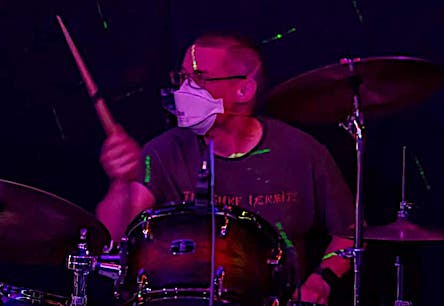 I started playing drums at 12 and began to record drum tracks for his songs. He showed me a few guitar chords early on, but my interest was always the drums. I got interested in recording once I learned how to use the 4 Track, and eventually bought one of my own, though I wasn’t very prolific. I really got into rap for a long time, in fact it’s still a favorite of mine. My first CD was Public Enemy’s Fear Of A Black Planet, and to me it’s still one of the greatest albums of all time.
I started playing drums at 12 and began to record drum tracks for his songs. He showed me a few guitar chords early on, but my interest was always the drums. I got interested in recording once I learned how to use the 4 Track, and eventually bought one of my own, though I wasn’t very prolific. I really got into rap for a long time, in fact it’s still a favorite of mine. My first CD was Public Enemy’s Fear Of A Black Planet, and to me it’s still one of the greatest albums of all time.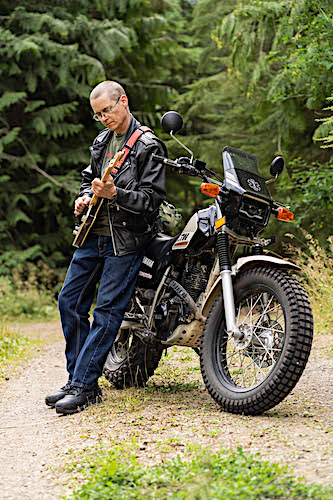 Jason Deatherage: I don’t know if I can really say how we fit into the sound, except that we’re here and doing what we do, and people have been very accepting so far. My influences are so seemingly distant from what’s going on in the scene, that I sometimes worry that everyone will wake up and say, “what the hell is this guy doing?” I’m definitely not a surf traditionalist in any sense, and I don’t deliberately draw from any particular source for inspiration, especially not the usual surf influences.
Jason Deatherage: I don’t know if I can really say how we fit into the sound, except that we’re here and doing what we do, and people have been very accepting so far. My influences are so seemingly distant from what’s going on in the scene, that I sometimes worry that everyone will wake up and say, “what the hell is this guy doing?” I’m definitely not a surf traditionalist in any sense, and I don’t deliberately draw from any particular source for inspiration, especially not the usual surf influences.  mwe3: What is your take on the internet and it’s place in the music world of the 2020’s? It seems like there is much more exposure for music and albums but it’s also harder for bands and artists to gain more sales / traction simply due to the number of gifted artists recording these days. Any ideas on making the playing field more level?
mwe3: What is your take on the internet and it’s place in the music world of the 2020’s? It seems like there is much more exposure for music and albums but it’s also harder for bands and artists to gain more sales / traction simply due to the number of gifted artists recording these days. Any ideas on making the playing field more level?